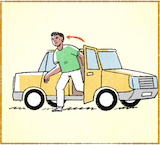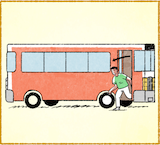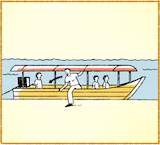


พุซายคนนี้กำลังเฮ็ดหญัง พุซายคนนี้กำลังก้าวขา ถกขาออกมาจากในลด เขากำลังลงลดเนาะ เป็นลดกะบะเนาะ ลดกะบะคันบักใหญ่หนึ่ง เขากำลังลงจากลดมาเนาะ
เขากะเอาก้าวขาขวาลงก่อน แล้วกะขาซ้ายกำลังสิก้าวลงมา
แล้วเขาสิญ่างไปใส จักคือกัน เขาอาดสิไปตะหลาด ลงไปซื้อของ ไปซื้อนั้นซื้อนี้ หลือว่าฮอดบ้านเขาแล้ว เขากะสิลงลดกะได้
7
พุซายคนนี้กำลังเฮ็ดหญัง พุซายคนนี้กำลังลงลด เป็นลดบั่ดเนาะ เขากำลังลงจากลดบั่ด
เป็นหญังเขาคือลงจากลดบั่ด เขาอาดสิฮอดบ้านของเขาแล้ว อาดสิฮอดหม้องฮอดบ่อนที่เขาสิไป หลือว่าจุดมุ่งหมายของเขาแล้ว เขากะต้องลงจากลดคันนี้
8
เขากำลังเฮ็ดหญัง เขากำลังขึ้นมาจากเลียเนาะ
เป็นหญังเขาต้องขึ้นมาจากเลีย อันนี้กะอาดสิแบบว่า เขาฮอดหม้องที่เขาสิไปแล้ว หลือว่าฮอดหม้องที่เขาสิมาแล้ว เขากะต้องขึ้นมาจากเลียเนาะ
แล้วเขานั่งเลียมาจากใส อันนี้กะบ่ฮู้คือกัน เขาอาดสินั่งเลียมาจากอีกหม้องหนึ่ง อีกฝั่งน้ำพุ้น หลือว่าไกๆ พุ้น เขาอาดสินั่งเลียโดยสานมาฮอดจุดมุ่งหมายของเขาแล้ว เขากะต้องขึ้นจากเลีย หลือว่าขึ้นมาเทิงฝั่งเนาะ
กะมีขาขาหนึ่ง เขากำลังถกขึ้นมา หลือว่าก้าวขึ้นมาจากในเลียเนาะ กะอีกขาหนึ่งบ่ทันได้ถกออกมา กะอาดสิถกมาอีกในบ่โดนนี้เนาะ
Link to overview page
Link to dictionary
| Isaan | Pronunciation | Tones | Thai | English/Notes |
|---|---|---|---|---|
| พุซาย | phu-sa:i | H-HR | ผู้ชาย | man, male |
| คน | khon | HR | คน | person, people |
| นี้ | ni: | HF | นี้ | 1. this 2. here |
| กำลัง | gam-laŋ | M-HR | กำลัง | auxiliary indicating continuous or progressive action |
| เฮ็ด | het | H | ทำ | to do, to make |
| หญัง | ɲaŋ | M | อะไร, เป็นหญัง = ทำไม | 1. what {เขากำลังเฮ็ดหญัง = What is he doing?} {ธูปเอาไว้เฮ็ดหญัง = What are incense sticks for?} 2. something, anything, (nothing) 3. เป็นหญัง[...]คือ in initial position: why {เป็นหญังเขาคือใส่บักพิกลงไปในกวยเตียว = Why is he putting chili in [his] noodle soup?} {เป็นหญังหน้าต่างมันคือเปิด = Why is the window open?} {เป็นหญังมันคือมีควนไฟ = Why is there smoke?} |
| ก้าว | ga:o | HF | ก้าว | to step |
| ขา | kha: | M | ขา | leg {ขาหน้า = front leg} {ขาหลัง = hind leg} {ส้งขาญาว = long trousers} |
| ถก | thok | M | ถก | to pull out |
| ออก | ɔ:k | LF | ออก | 1. to go out, to leave 2. out |
| มา | ma: | HR | มา | 1. to come 2. auxiliary expressing action towards the present or focal time {กะคุเฮ็ดมาจากอี่หยัง = What is the bucket made of?} {แล้วเขากะเก็บเงินจากพุนั้นมา = and then she takes the money of that person} |
| จาก | ja:k | LF | จาก | 1. from {... เฮ็ดมาจากอี่หยัง = ... is made from what?} 2. to depart |
| ใน | nai | HR | ใน | in, within |
| ลด | lot | H | รถ | 1. car, motorized vehicle 2. vehicle, cart {ลดขายแนวกิน = food cart} |
| เขา | khao | M | เขา | personal pronoun: he, she |
| ลง | loŋ | HR | ลง | 1. to descend, to lower, to go down 2. down 3. bus/train etc.: to get off, to disembark {คนกำลังลงลดบั่ด = people are getting off the bus} 4. boat/ship etc.: to get on, to board {เขากำลังญ่างลงเลีย = he's boarding/getting on the boat} |
| เนาะ | nɔ | H | เนาะ | final particle: makes the statement softer, looking for agreement |
| เป็น | pen | M | เป็น | 1. to be, to exist 2. to be able to 3. to suffer, sth. happens to 4. เป็นหญัง[...]คือ in initial position: why? {เป็นหญังเขากะคือแปงฟัน = Why is he brushing his teeth?} {เป็นหญังเคี่ยงบินมันคือสิตก = Why is the airplane falling down?} |
| ลดกะบะ | lot-ga-ba | H-M-M | รถกระบะ | pick-up |
| คัน | khan | HR | คัน | clf. for cars, trains, motorbikes, boats {ลดไฟคันนี้ = this train} {ลดเก็งคันสีเขียวคันน้อย = a small green car} |
| บัก | bak | M | 1. intensifier before adjectives {ปาโตบักใหญ่ = a (very) large fish} 2. prefix in front of fruits and vegetables {บักแตงโม = watermelon} 3. can be used as a reference for a male person of the same or younger age {บักอันนี้ = this lad} |
|
| ใหญ่ | ɲai | H | ใหญ่ | large, big |
| หนึ่ง | nʉŋ | H | หนึ่ง | 1. one 2. after adjective: intensifier {บักคักหนึ่ง = very much} {อันบักใหญ่หนึ่ง = very large}, or attenuates the meaning {กะดาดมันแผ่นน้อยๆ หนึ่ง = the piece of paper is [relatively] small} |
| กะ | ga | M | ก็ | 1. then, consequently 2. also |
| เอา | ao | M | เอา | to take, to give {เขากำลังเอาก่องไปซั่ง = he's taking the boxes to weigh them} {หมอกำลังเอายาให้คนป่วยกิน = the doctor is giving medicine to the patient} {เอาไว้ถ้า = is for, is used for, has the purpose of} |
| ขวา | khwa: | M | ขวา | right |
| ก่อน | gɔ:n | H | ก่อน | 1. before 2. first, first of all |
| แล้ว | lɛ:o | HF | แล้ว | 1. finished 2. already 3. and then, and next (especially แล้วกะ) 4. auxiliary for past tense |
| ซ้าย | sa:i | HF | ซ้าย | left |
| สิ | si | M | จะ | future tense auxiliary {เขากำลังสิตื่น = he's about to wake up} {สิไปตะหลาด = [I'm] going to the market} |
| ญ่าง | ɲa:ŋ | H | เดิน | to walk {เขากำลังญ่างเว้ากัน = they are walking and talking} {ลูกเป็ดญ่างไปนำแม่เป็ด = the ducklings are [walking] following their mother} {เขากำลังญ่างข้ามสะพาน = she's walking over the bridge} {เขาสิญ่างไปใส = Where is he going?} |
| ไป | pai | M | ไป | 1. to go 2. auxiliary indicating action extending into the future |
| ใส | sai | M | (ที่)ไหน | 1. where? {สิไปใส = Where are [you] going?} {มาแต่ใส = Where are [you] coming from?} {กะทะอยู่ใส = Where's the pan?} 2. somewhere, anywhere {ใสกะได้ = anywhere, wherever you like} |
| จัก | jak | M | จัก | 1. answer to a question: [I] don't know, don't know exactly, [I'm] not sure {พุซายคนนี้เขาเถ้าไป่ จัก จักเถ้าหลือบ่เถ้า เบิ่งบ่ค่อยออก = Is this man here already old? I don't know. I can't see clearly whether he's old or not.} {เขาเว้ากันอยู่ใส จักคือกัน = Where are they talking? I don't know either.} 2. exact(ly), what exactly {จักต้มอี่หยังกะบ่ฮู้ = I don't know what (exactly) he is cooking} {บ่ลู้คือกันจักปาอี่หยัง = I don't know either what kind of fish this is} 3. how much/many? {ต้นไม้มีจักต้น = How many trees are there?} {ตอนนี้จักโมงแล้ว = What time is it now?} {มือของเฮานี้สิมีจักนิ้ว = How many fingers do our hands have?} 4. a bit, a little bit {จักหน่อย/จักหน่อยหนึ่ง = a bit, a little bit} |
| คือกัน | khʉ:-gan | HR-M | เหมือนกัน | 1. also, likewise, similarly {ยินดีที่ได้ฮู้จักคือกันคับ = Nice to meet you too!} 2. in negative sentences: either {บ่ลู้คือกัน = I don't know either} {จักคือกัน = I don't know (either)} |
| อาด | a:t | LF | อาจ | 1. might, may, will 2. likely |
| ตะหลาด | ta-la:t | M-LF | ตลาด | market |
| ซื้อ | sʉ: | HF | ซื้อ | to buy |
| ของ | khɔ:ŋ | M | ของ | thing, object |
| นั้น | nan | HF | นั้น | that, there |
| หลือ | lʉ: | M | หรือ | or |
| ว่า | wa: | H | ว่า | 1. that, as {คำว่า X = the word X} 2. to say |
| ฮอด | hɔ:t | HF | ถึง | 1. to arrive, to attain {ฮอดจุดหมายปายทาง = (airplane, train etc.) to arrive at one's destination} {มันทันได้ฮอดหกโมงอยู่ = it's not yet 6 o'clock} 2. to, at {ผมญาวฮอดบ่าไหล่เอาโลด = long hair down to the shoulders} 3. about {บ่ได้เว้าฮอด = [I] haven't talked about [this]} {คนที่เฮาเว้าฮอดวั่งหั้นหละ = the person we've just talked about} |
| บ้าน | ba:n | HF | บ้าน | 1. house, home 2. village (also used as a prefix before the name of a village) 3. home country, home region {บ้านเฮาเฮ็ดเข้าจั่งใด = How do we plant rice in Isaan/Thailand?} |
| ได้ | dai | HF | ได้ | 1. can 2. to get, to obtain 3. before verb: indicating past tense 4. บ่ได้ + verb: not |
| ลดบั่ด | lot-bat | H-H | รถบัส | bus |
| คือ | khʉ: | HR | คือ | 1. to be, to resemble, like, as 2. why {บักหล้าคือบ่เก็บโต่ะแน่ = [addressing a young boy] Why haven't you cleared the table?} |
| ของ | khɔ:ŋ | M | ของ | of, belonging to |
| หม้อง | mɔŋ | LF | ที่, แห่ง, บริเวณ | 1. place, area {หลายที่หลายหม้อง = in many places} {หม้องใดหม้องหนึ่ง = some place} 2. clf. for places |
| บ่อน | bɔn | H | ที่, ที่นอน | 1. place 2. clf. for places 3. place for sleeping |
| ที่ | thi: | H | ที่ | 1. that, which {คนที่ยืนอยู่ฝั่งขวา = the person which is standing on the right = the person standing on the right} {เว้าคำที่บ่สุพาบ = to speak words which are impolite = to speak impolitely} 2. for ordinal numbers {ที่สาม = third} |
| จุดมุ่งหมาย | jut-muŋ-ma:i | M-H-M | จุดมุ่งหมาย | 1. goal, aim, objective 2. purpose, intention |
| ต้อง | tɔŋ | HF | ต้อง | to have to, must |
| ขึ้น | khʉn | LF | ขึ้น | 1. to go up, to increase 2. sun: to rise {ตะเว็นกำลังขึ้น = the sun is rising} 3. more 4. bus/train etc.: to get on, to board {พุโดยสานขึ้นลดไฟเบิดแล้ว = all passengers have boarded the train} |
| เลีย | li:a | HR | เรือ | boat Notes: pronunciation: also realized as เลือ |
| อัน | an | M | อัน | 1. thing, object 2. general clf. for objects |
| แบบ | bɛ:p | LF | แบบ | 1. example, model, kind 2. style, form, pattern, design |
| นั่ง | naŋ | H | นั่ง | to sit |
| บ่ | bɔ: | H | ไม่ | 1. no, not 2. question particle, transforming a statement into a question Notes: spelling exception in line with common usage on social media |
| ฮู้ | hu: | HF | รู้ | 1. to know 2. to understand Notes: equivalent to ลู้ |
| อีก | i:k | LF | อีก | 1. more, again 2. other, another |
| ฝั่ง | faŋ | H | ฝั่ง | 1. side 2. river/canal bank, shore |
| น้ำ | na:m | HF | น้ำ | 1. water 2. drink, soft drink, juice |
| พุ้น | phun | HF | นู่น | over there |
| ไก | gai | M | ไกล | far, distant |
| โดยสาน | do:i-sa:n | M-M | โดยสาร | pertaining to being a passenger {ลดโดยสาน = vehicle for passenger transport, e.g., a bus} |
| เทิง | thə:ŋ | HR | บน | 1. on, on top of, at, in {เทิงโต่ะ = at/on the table} {กบมันนั่งอยู่เทิงใบบัว = the frog is sitting on the lotus leaf} {เทิงท้องฟ้า = in the sky} {มันแล่นอยู่เทิงลาง = [the train] runs on rails} {มีคนนั่งอยู่เทิงลดสามล้อสามคน = there are three people sitting in the tuk tuk} 2. up, upward Notes: pronunciation: also realized as ทัง |
| มี | mi: | HR | มี | 1. to have 2. there is |
| บ่ทันได้ | bɔ:-than-dai | H-HR-HF | ยังไม่ได้ | not, not yet {บ่ทันได้กินเข้า = [I] haven't eaten yet} {อายุบ่ทันได้หลาย = not yet old} {เขาอาดสิบ่ทันได้เถ้ากะได้ = maybe he's not yet (that) old} Notes: see also ทันได้ which is apparently equivalent |
| โดน | do:n | M | นาน | time: long |